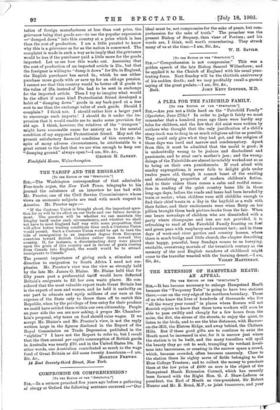THE TARIFF AND THE EMIGRANT. [To THE EDITOR OF THE
"SPECTATOR."]
SIE,—The Washington correspondent of that admirable Free-trade organ, the New York Times, telegraphs to his journal the substance of an interview he has had with Mr. Proctor, one of the Civil Service Commissioners, whose views on economic subjects are read with much respect in America. Mr. Proctor says :-
"If the Customs Union is brought about, the important ques- tion for us will be its effect on our *ado and our future develop- ment. The question will be whether we can maintain the Dingley tariff under such circumstances, and whether we shall not have to meet England half way with some proposition that will allow better trading conditions than such a Customs Union would permit. Such a Customs Union would be apt to turn the tide of immigration to an important degree from European countries toward British Colonies rather than toward this country. If, for instance, a discriminating duty were placed upon the grain of this country and in favour of grain coming from Canada into England, the result would be to attract immigrants to Canada."
The present importance of giving such a stimulus and direction to emigration to South Africa I need not em- phasise. Mr. Proctor's view was the view so strongly held
by the late Mr. James G. Blaine. Mr. Blaine held that for fifty years past a preferential tariff would have deflected Britain's emigrants to fill her own waste places. He con- sidered that the most valuable export trade Great Britain has is the export of men and women, and he held it unthrifty on our part to educate and equip millions of our race at the expense of the State only to throw them off to enrich this Republic, when by the privilege of free entry for their produce we could have settled them within our own citizenship. People on your side the sea are now asking, a propos Mr. Chamber- lain's proposal, why taxes on food should raise wages. If we accept Mr. Blaine's and Mr. Proctor's view, is not the reply written large in the figures disclosed in the Report of the Royal Commission on Trade Depression published in the
" eighties" ? I have not the Report to refer to, but I recall that the then annual per capita consumption of British goods in Australia was nearly 210, and in the United States 10s. In other words, one Australian contributed as much to the wage fund of Great Britain as did some twenty Americans.—I am,










































 Previous page
Previous page